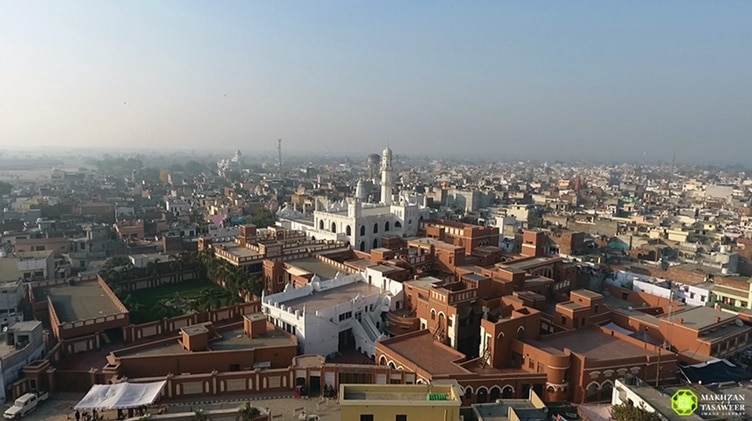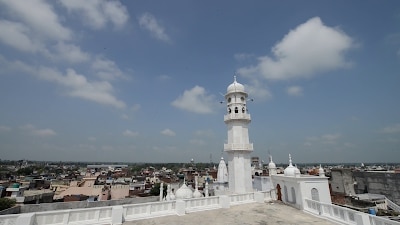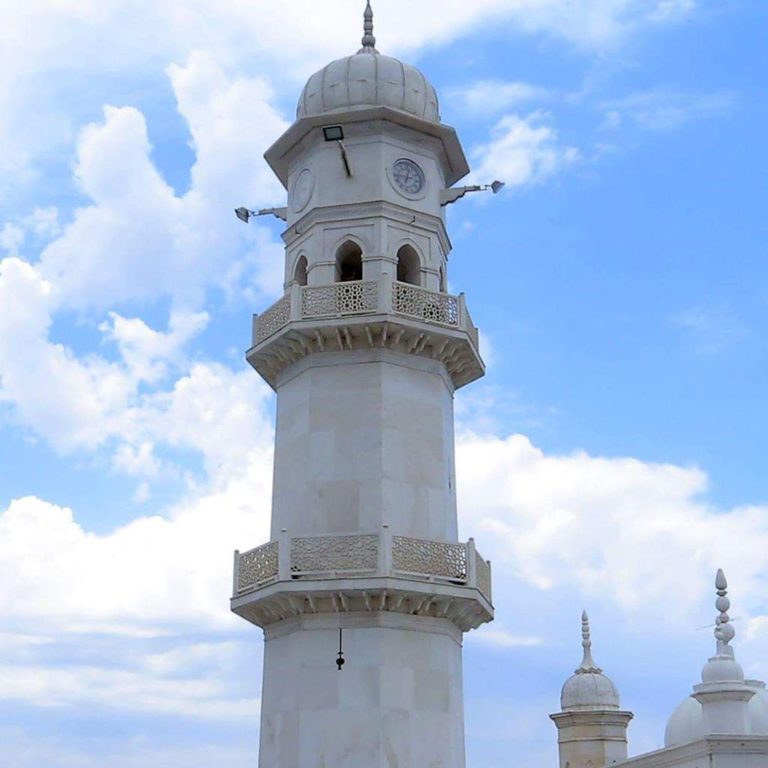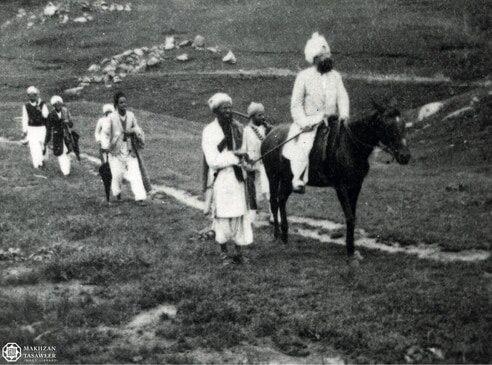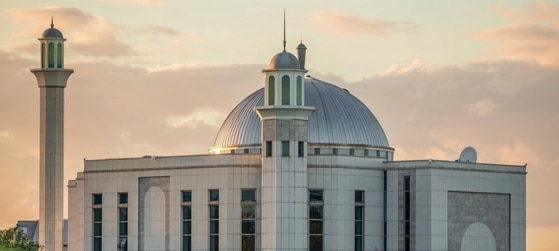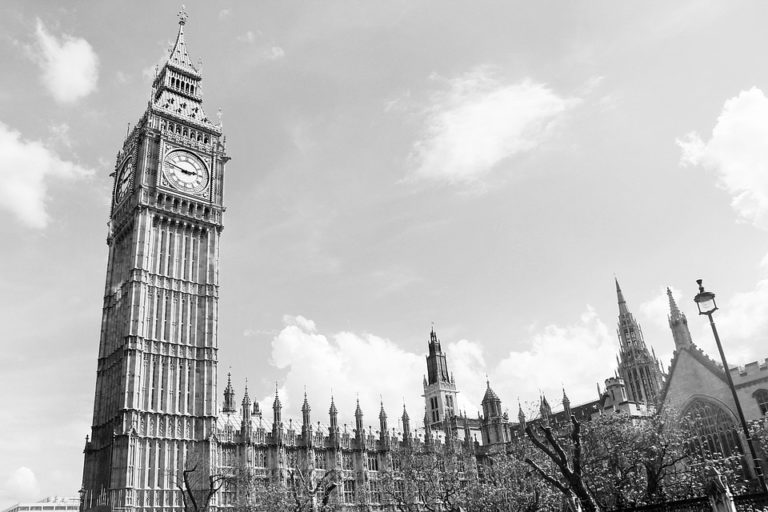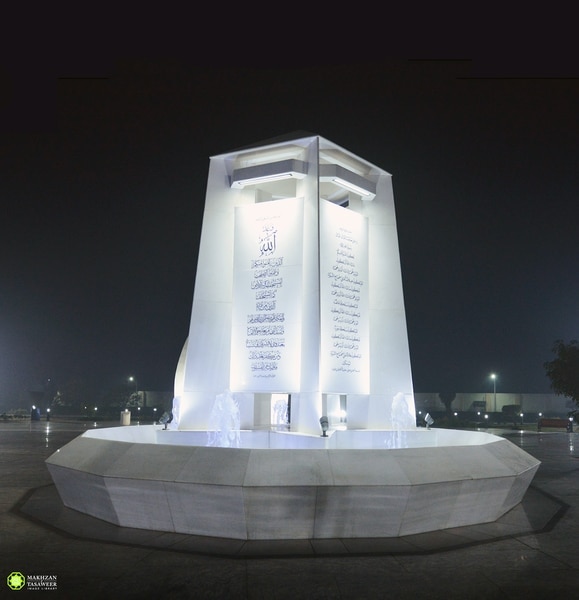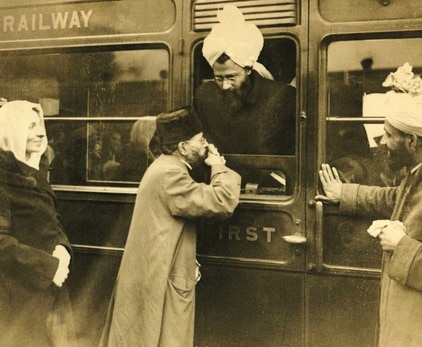In Al Hakam (Urdu), 21-28 May 1918, we found an historic article written by the brother-in-law of Hazrat Mirza Ghulam Ahmadas, Hazrat Mir Muhammad Ismailra on the blessed memory of the Promised Messiahas. This was written for those individuals who were not able to physically meet the Promised Messiahas and was written as an alternative to the photographs of the Promised Messiahas.
Al Hakam (Urdu), 21-28 May 1918
Hazrat Mir Muhammad Ismailra, Brother-in-law of Hazrat Ahmadas
By the grace of God, Ahmadis are spread throughout India. In fact they are present throughout the world. But among them, there is a difference between those who have seen Ahmadas and those who have not.
Those who were blessed to benefit from his noble presence possess a sense of serene pleasure in their heart which resonates with them to this day. Whereas those who were unable to see him are often found to lament this and regret their delay and the fact that they were not able to see the face of their beloved in his lifetime.
There always remains a stark difference between a picture and the reality, something only those can relate to who saw the face of the Promised Messiahas with their own eyes.
It is my earnest desire to describe the appearance and practices of Hazrat Ahmadas so that those who were not able to see this blessed individual might benefit from it.
Form and Features
Instead of going into detail about the Promised Messiah’sas appearance, I deem it better to write more generally so that readers are able to draw their own conclusion.
The appearance of the Promised Messiahas can be summarised in a single sentence: He was a perfect example of masculine beauty. But this statement is incomplete if another is not added to it: His humanly charm and beauty carried a spiritual glow and aura with it.
As he was raised for the Ummah to manifest the beautiful and peaceful aspects of Islamic teachings, similarly his physical beauty was a manifestation of God’s omnipotence and would draw the heart of the observer towards him.
His face, illumined with spirituality, never exhibited arrogance, haughtiness or the slightest pride, rather it always manifested love, humility and modesty.
Once, the Promised Messiahas went to Dera Baba Nanak to see the cloak of Guru Baba Nanak. Upon his arrival a cloth was spread under a tree where they all sat. His arrival had brought people in from outlying villages, eager to see him and greet him.
Unaware of whom the Promised Messiahas was, people started approaching Maulvi Syed Muhammad Ahsan Sahib and after shaking hands with him they would take a seat. After a while the reality was disclosed by Maulvi Syed Muhammad Ahsan Sahib who signaled towards the Promised Messiahas and revealed the reality upon everyone.
A similar incident occurred when the Holy Prophetsa migrated to Medina. Even on that occasion people mistook Hazrat Abu Bakrra for the Holy Prophet Muhammadsa. To remove their misconception Hazrat Abu Bakrra took his cloth and shaded the Holy Prophetsa and hence corrected the mistake.
Physique and Height
The Promised Messiahas was neither thin nor stout. He was of stocky build and of average height. Although his height was not measured, it was around five feet, eight inches. His shoulder blades were spaced apart and to his last age he did not lose posture. All parts of his body were perfectly proportioned. Neither his hands nor legs nor stomach were out of proportion. Hence no unpleasant features were to be witnessed in his body parts. His skin was neither soft as of women nor rough. His body was strong-jointed and possessed the toughness of the youth. In his last years his skin neither wrinkled nor withered.
Complexion
He had a striking ruddy complexion. It possessed the aura and grandeur of spirituality. This was a permanent spectacle. His colour never faded in times of hardships and trials rather it would shine like bright gold. No hardship or difficulty was able to wither it away.
Apart from this aura his countenance was always brimming with a delight and a permanent smile on his face. An observer would remark: If he is false in his claim and aware of his lies then why does his face always manifest the signs of triumph, happiness, delight and serenity? Such faithful manifestations can never be attributed to a wicked person and the light of faith can never shine on the face of a wrongdoer.
When the sun set on the final day of Atham’s respite – set by Divine prophecy vouchsafed to the Promised Messiahas – faces of some members of the Jamaat seemed dejected with dismay and their hearts had sunk. Some naively made bets that Atham would surely die before the prophecy’s set period. They wept in their prayers before their Lord to fulfil the prophecy by putting an end to Atham and deliver them from imminent shame and the bitter jeers and jibes of their opponents that would ensue. There was great commotion which turned the faces of the beholders pale out of fear. But this fearless lion of God marched out of his house with a victorious smile on his face, called his followers to the mosque and announced that the prophecy had been fulfilled, drawing their attention to the qualifying words of the prophecy:
اطلع الله علي همّه و غمّه
“God has informed me that Atham has turned to the truth, so the All-knowing God has allowed him a respite.” Those who were listening saw his contended face and believed him to be true. They contemplated upon the fact that they were being devoured by hopelessness and here he was standing in front of them, jubilant with satisfaction on his face and talking without any signs of dismay, rather with utmost delight.
It seemed as if God had appointed him to judge the matter of Atham. And upon witnessing Atham’s renouncement from his denunciation of Islam and observing his restlessness, Hazrat Ahmadas allowed Atham respite from death. And now he was delighted as if a victorious wrestler out of his beneficence and mercy had forgiven his opponent, considering it an insult to kill someone who was already moribund.
The prophecy about Lekhram was later fulfilled according to its terms and conditions. The foulmouthed started to raise false accusations. A police report was filed to investigate Ahmadas. The Police Superintendent arrived with a force of constables to search his house. The movement of everyone in the house was restricted. The acrimonious opposition was eager to find a single doubtful word that could be found in his correspondence or documents to prove him a culprit. But there he was, standing with full contentment and serenity. He himself would provide all documents, books, bags and letters in the house to the police to assist them in their inquiry and showed them all around the storerooms. Some of the letters that required a second look were taken into custody but nothing changed for Ahmadas. His face still shone like the full moon and manifested utter contentment and jubilancy. It was as if the investigation had further cemented the proof of a manifest victory and established his sheer innocence in this regard.
And then there were those outside the house, terrified and silent as they witnessed constables coming in and out of his house. Their faces had grown pale, unaware of the fact that the person for whom they were worried was himself calling upon constables to search his documents and letters.
Ahmad’sas face conveyed a delightful cheer revealing that now the time had ripened and the truthfulness of his prophecy would be revealed in its complete terms and he would be proven innocent from all false claims made against him.
Hence in all trials and tribulations his courage was singular, calm and imperturbable. Not for a single moment did he act out of spite and this caused many pure souls to accept the truth.
Hair
His hair was straight, shiny and silky and were kept dyed with henna. It was not thick or abundant. He would never have his head shaved nor would he have his hair cut too short. His hair would reach up to his neck. He would oil his hair with jasmine oil and henna and this was a constant practice.
Beard
He had a full, dense, striking beard on all sides with thick, straight and shiny hair, dyed with henna. The length of his beard would always be the size of a fist and he would have a regular cut to keep it straight and equally spread downwards. It was neither sparse nor dense. It was always oiled. Once due to the appearance of a small pustule on the cheek he had his hairs completely removed from that particular spot. Those hairs are still in the custody of his companions. The hairs of his beard were neither scarce nor so dense as to continue up to his eyes.
Hair Dye
Earlier he would dye his hair with hair dye and henna. But later due to constant severe headaches he would dye his hair with henna only. For some days he also tried manufactured hair dye but later ceased its use.
In his last days one of his companions Mir Hamid Shah prepared a hair dye for him that he also used. It blackened the beard but as for his lifetime routine he would dye his hair with henna. He would have this applied by a hairdresser every Friday.
As was his beard, so were the hair of his moustache also thick, strong and shiny. He was in practice of trimming his moustache close to the upper lip but not like the Ahl-e-Hadith custom of completely shaving off the moustache.
He was not hirsute. His back was hairless. Sometimes he would trim the hair on his chest and stomach. A thin and soft lining of hair covered his shin and the back of his hands.
Face
He had a narrow, straight face. Even in his seventies there were no wrinkles, nor were there any frown lines as are visible on the forehead of short tempered people. Observers would always witness contentment, serenity and a hidden smile on his face. THe colour of his eyes was black. He would always keep his gaze lowered in accordance with the Quranic injunction. During discourses he would keep his gaze lowered even when addressing a gathering. Even at home, his looks would be restrained and he would not immediately notice all in attendance. It is also important to mention that he never used eyeglasses. His eyes would never get tired due to the overload of work. God promised to safeguard his sight and hence it remained unaffected until his death. Yet he was not able to witness the new moon with the naked eye. His nose possessed the traits of nobility; slim, straight, high and perfectly proportioned.
Forehead
The Promised Messiahas had light, leveled cheeks and his eyebrows were parted. His forehead showed all three qualities that, according to physiognomy, signify high standards of positive traits, attributes and manifest signs of intellect and a prolific mind: flat, broad and high, neither protruding nor sunken. Moreover, no frown lines were to be seen. His head was proportionate and was perfectly shaped as would see the physiognomists. His broad temple signified his high intellect.
Lips
Huzoor’sas lips were neither thin nor thick. The size of his mouth was moderate. He would keep his mouth closed when silent unlike those who always keep it open.
In a gathering he would cover his mouth with the loose end of his turban. In the final years of his life some of his molar teeth decayed which occasionally caused serious pain. Later, one such tooth decomposed and sharpened, which wounded his tongue and so, was coarsened with a file. He never had any of his teeth extracted. He habitually used miswak to brush his teeth.
In the summer, his heels would sometime become coarse. He used to wear warm clothes in the cold as well as in hot seasons. In summer he would perspire but his clothes never gave out any odour, whatever the weather.
Neck
Huzoor’sas neck was moderate in length and width. Following in the footsteps of the Holy Prophetsa he would take care of his physical appearance. He would regularly bathe, have his hair and beard trimmed, comb his hair, dye his hair, clean his teeth with miswak, use perfume and use a mirror. But to always keep himself fashionably dressed was against his disposition.
Clothing
It should be noted that he was not selective with respect to clothes. In his last years he would receive simple sewn clothes as gifts especially from Sheikh Rehmatullah Sahib who would bring along gifts such as overcoats, waistcoats, trousers and long shirts along with him on the occasion of Eid-ul-Fitr and Eid-ul-Adha. These would be used aside from those that Huzooras would have prepared for his own use. He also used to wear a turban that he would, most of the times, purchase himself. As the clothes would come as gifts for his use, the used clothes were taken by his followers as blessed relics. Sometimes it would so happen that he would give out his clothes as a token of blessings to find no spare clothes for himself and new garments would have to be sewn. Some found wisdom in gifting him new clothes and then asking for old ones to be gifted to them.
This was an extra piece of information that I have provided for the sake of record.
Now I will mention the type of clothes Huzooras would wear. It was his custom to wear overcoats, waistcoats, trousers, long shirts and a turban. Moreover, he had a habit of keeping a handkerchief with him at all times. He would use socks in winter. His clothing had one unique factor that they were all sewn loose. Though the coats brought by Sheikh Rehmatullah Sahib were Western-styled, they would be long enough to cover his knees and a part of his shin. The typical Asian gowns and robes that he would wear would sometimes reach his ankles. Similarly his shirts and waistcoats were loosely stitched.
He was not in the habit of wearing vests as its fitting caused unease. He would keep the uppermost button of his shirts, overcoats and waistcoats unbuttoned. Similarly he always kept his cuffs unbuttoned. His custom was in accordance to the Quranic injunction:
مَا اَنَا مِنَ الْمُتَكَلِّفِیْن
[I am not of the pretenders.]
He kept himself distant from the formalities of this world. It was against his nature to bind himself in unnecessary limitations which were also rendered useless by the Sharia – Islamic teachings.
[His clothing and appearance was never his primary interest.] His focus was completely directed towards the mission he was entrusted with.
In his final years he would wear warm clothes in summer as well, which was due to his frail health. Winter season suited him not. In summer he would wear a muslin shirt underneath his coat. His trousers were designed in accordance with the principle prescribed by the Sharia. He also used to wear flared trousers as was the custom in those days but later he gave up this practice. In summer while at home, during the daytime and at night he would wear a dhoti [a long piece of cloth tied around the waist by men in South Asia].
He would commonly wear a waistcoat while at home and would wear an overcoat when going out. And during severe winter conditions he would wear two coats at a time, while sometimes adding a fur coat as well.
In the pocket of his waistcoat he would place his handkerchief. He would always keep a large sized handkerchief. Within that handkerchief he would keep his essential medicines such as musk and would tie within it important letters along with the cash he would receive as gifts from visitors in the mosque.
He had the habit of keeping a watch with him at all times. But as it needed winding periodically, therefore most of the time it would usually display the incorrect time. And as it would easily fall off from his pocket, therefore it was kept in the handkerchief. He kept the watch with him as a necessity and not for showing off. An observer could never find any form of artificiality in his life or clothes. Rather, it was in accordance with the Quranic injunction:
وَالرُّجْزَ فَاهْجُرْ
[And shun uncleanliness.]
He always preferred cleanliness in every matter and abhorred uncleanliness. He was so cautious that he would himself pour bleach in the toilet if there was no one else to do so.
Headdress
He would wear a turban made from ten yards of muslin. He would keep the loose end of the turban to the length of his back. Sometimes he would set it to the front of his chest and sometimes would cover his mouth with that end while sitting quietly in a gathering.
He would tie his turban in a special manner. At home he would loosely tie his turban shaping it on the front side.
Under his turban he would wear a Rumi [Turkish] cap and while at home he would only keep the Rumi cap on his head made from soft material.
He would wear socks during winter and would wipe over them with his hands [Masah] while performing ablution. In severe weather conditions he would wear two pairs of socks, one over the other…
He would wear any kind of slippers available to him if they were loose. He did not have the habit of wearing English-style boots. I never saw him wearing moccasins. (He did wear moccasins – Editor Al Hakam Urdu.) Hazrat Hakim Maulvi Nuruddin Sahib, Khalifatul Masih Ira used to wear them. If the Promised Messiah’sas shoes were tight then he would press them down from the heels.
Here I would also like to mention that he used to keep a staff. At home or while going to Masjid Mubarak he would not use it. But when he went to Masjid Aqsa or took a walk he would hold a staff in his hand. For this he preferred thick and strong wood. He would never walk by supporting his body with the staff as is done by the elderly.
During the summer season he would keep a flannel on his shoulder and while sitting, would use it to cover his feet.
As regards the care of his clothes, at night while going to sleep he would spread his coat, cap, waistcoat and turban on his bed or under his pillow and would sleep over them. All night these clothes which some would hang on hangers to save them from being creased would be under his body; if a fashion enthusiast ever saw the consequences, they would certainly be left perplexed.
During the summer season, both day and night (mostly at night) while at home he would take off his clothes and would only wear a dhoti. He would also take off his shirt when prickly heat would appear on his body. His dhoti would mount up to the middle of his shin and I never saw his knees uncovered.
He also used to have a bunch of keys with him that would be tied to his handkerchief or robe belt. He was not in habit of wearing woolen coats. Nor would he appear in public, covering his body with a woolen quilt. He would keep a flannel but would never cover his head with it. Rather he would always cover his shoulders with it. He was not accustomed to gloves or neckties.
His bed would be a long and wide quilt made of at least approximately twelve pounds of wool. He would use this bedding in both winter and summer seasons due to his discomfort in the cold. A cotton sheet would be spread over his bedding with a pillow.
He would perform most of his literary work on his bed. All the necessary stationery items including an inkpot, paper and pen were always kept on his bed as that place served him as his desk, chair and library. And one could witness in his routine the practical example of:
وَمَا اَنَا مِنَ الْمُتَكَلِّفِيْن
[“I am not of those who are given to affectation.” (Ch.38: V.87)]
There is one point I forgot to mention: Against the practice of the affluent of that time, he would not change his clothes daily, rather he would change them when he felt a difference in its neatness.
Food intake
With regards to the unbelievers it says in the Holy Quran:
يَاْكُلُوْنَ كَمَاتَاْكُلُ الْاَنْعَام
[“They eat even as the cattle eat.” (Ch.47: V.13)]
It is narrated in a Hadith that a believer eats in one intestine and a non-believer eats in seven intestines. It means that a faithful believer eats clean food and, in contrast with a worldly individual, he is satisfied with little food. Such is the standard of a believer and surely prophets are the bearers of far exalted standards.
The ascetic lifestyle of the Holy Prophet Muhammadsa did not allow for more than one kind of food to be served at each meal. His table would not be rich with several dishes, rather it would only have a single dish. He would at times suffice on sattu [a drink of parched grains and cereal powder or flour], a cup of milk or a single date.
Following on the precepts of the Holy Prophetsa, the Promised Messiahas had a very modest appetite. The enormity of work and mental activity in which he was involved was no comparison with his intake of food. An observer would indeed question how he subsisted on such a diet. He would never overindulge in food, no matter how appetising the food seemed. He would usually eat twice a day but when ill, he would eat only once a day.
Apart from this, he would have a cup of tea in the morning as breakfast but to my observation he never yearned for appetising food.
Schedule
As a routine he would eat his lunch between the time-frame of ten o’clock and the Azan for Zuhr prayer, and in the evening, he would eat a meal between Maghrib prayers and before going to bed. Very rarely would he eat lunch after Zuhr. Similarly, he was not in the habit of eating dinner before Maghrib prayer, however sometimes he would. As for dinner, he had two different routines; when he would sit outside along with his companions from Maghrib to Isha, he would dine after Isha at home, otherwise he would have dinner between Maghrib and Isha prayers.
For a long period, he had his meals with his guests. A table would be set in the Gol Kamra [the room allocated for guests in Qadian] or in Masjid Mubarak. Special guests enjoyed the honour to sit with him at the table. These would usually be shortlisted by the Promised Messiahas himself. The number of guests at the table would reach 10 or even 25 at times. (At times, the number would exceed this and would usually not be a specified number – Editor.)
At home, he would sometimes eat alone but mostly would be accompanied by his wife Ummul Momineen [Hazrat Nusrat Jehan Begum Sahibara] and one of his children, if not all of them. When I would visit Qadian, I also enjoyed the humbling honour to eat at the same table as Huzooras.
Huzooras would eat sehri at home. At home, he would sometimes eat in the same plate along with one or two other individuals or sometimes he would alone. Outside he would eat separately. This was not something he had instructed, rather his companions would serve him in a separate dish out of respect. Some guests at different times were also served in separate dishes.
Manners at the dining table
When a meal was served or the table was set, he would ask the gathering, “Kiyun ji, shuru kareyn?” [Shall we start?] This was asked to confirm the presence of every guest present at his house or to confirm if the meal was readily available to every individual present. Upon confirmation, the meal would initiate.
He would eat slowly, chewing each morsel well. He was not voracious during meals. He would also discourse on various subjects while eating, unlike the non-Ahmadi Maulvis of today who become so engrossed in their meals that they are unaware of their surroundings and find little opportunity to converse in secular or religious discussions.
Huzooras would consume a negligible amount of curry. On special occasions, when tables would be filled with different dishes, he would confine himself to a single dish placed in front of him, yet at the end of the feast, that very dish would seem untouched.
He forsook gluttony and possessed a moderate taste for meat and vegetables. He would taste the curry with the tip of his finger and would bite a piece of roti [South Asian flatbread cooked on a griddle]. He would make several pieces of the roti, making small morsels of each piece. This was his practice.
After the meal, there would be small pieces of roti and his companions would eat those leftover pieces. He ate so little that, though everyone was served in the same quantity, the most food could be found from his side of the table. With the excuse of obtaining blessings, those who were still hungry would pick up Huzoor’sas leftovers as soon as he would depart.
Most of the times, as has been mentioned earlier, he would place a morsel in his mouth and taste the curry with the tip of his finger to create a salty taste. Previously when he would eat at his home, in the morning he would eat makai ki roti [roti made from cornflour] along with saag, lassi [a drink made of yoghurt] and butter. Sometimes he would use pickle. He did not live to eat; he ate to live.
He is recorded to have stated on several occasions after he had eaten a meal that he had not known what was cooked and what he had eaten. It was not his conduct to chew on hidden meat from bones or to belch or to eat chunks of roti voraciously or to make noises while eating. Neither would he lick his plate nor would he criticise the cooked food, so much so that it was against his custom to sing praises about the cooked food. Rather he would eat what was served to him. Sometimes he would hold a glass of water or a cup of tea in his left hand. He would narrate that in childhood, his right hand had received a severe injury and hence was still unable to carry even a small weight. He would never sit down in a squat posture to eat, rather he would be seated cross legged or with his right knee upright while resting upon his left leg.
Type of diet
As mentioned earlier, he ate to gather strength and not to satiate his taste buds or to derive pleasure. Therefore, he ate nutritious foods that provided him mental and physical strength and which would be in accordance to his disposition to avoid negligence in his tasks. Moreover, due to some ailments he had to refrain from certain types of food. Normally he ate whatever he was provided, keeping within the boundaries of permissible foods. Though he would be regularly asked what should be cooked for him, to my utmost knowledge he would never insist on having a specific kind of food. He never criticised the food if it wasn’t cooked to a decent standard, nor did he ever express disgust, unlike many who angrily hurl dishes across the room if the food is not to their liking. If ever he did criticise, it was done considering his guests who may have disliked the food.
He used to eat roti baked on a griddle or in a clay oven. He also used to eat slices of baked bread [of loaves] with tea or biscuits and bakarkhani [puff-pastries]. He would also permit consuming Western-manufactured biscuits. He would assert that the manufacturers of biscuits claimed that they would cook them in butter, and so he would say that there was no need, then, to hold suspicion or to give in to uncertainty and assume that they might have cooked the biscuits in lard. In his last seven to eight years he suffered from diarrhoea, therefore he would use cornflour bread.
He also used to eat shirmal [saffron-flavoured roti from Lucknow and Hyderabad], and as mentioned earlier he would eat bakarkhani, kulcha [nan bread with sesame seeds] or any other type of roti that was presented to him.
He would eat a very small amount of curry. Meat was cooked twice a day at his house but he preferred lentils to meat. He would prefer dal mash and urad dal [types of lentil soup] commonly found in the Indian province of Gurdaspur. Every type of curry and vegetable was seen at his table. He also used to eat every form of Halal meat and that which suited his disposition.
He preferred the meat of the birds, hence when he would feel ill, he would ask Sheikh Abdur Rahim Sahib, a recent convert to Islam, to provide him with the meat of grey francolins or doves. He also preferred chicken and quail. However, after the plague struck Punjab, he never ate quail and would discourage others as well saying that it harboured the ability to promote the plague. The Bani Israil were, similarly, stricken with the plague, transmitted to them from the infected quails.
When the meat of a monitor lizard was presented to Huzooras, he did not eat it following the dislike once shown to it by Holy Prophetsa, but he never forbade others to eat it. Some of his guests, family members and companions ate its meat but he did not allow it to be brought near him.
He would eat chicken, cooked in any form, whether in curry, roast or used in kebabs or pilau [South Asian rice]. A chicken’s leg piece would usually suffice in his diet, although sometimes even that would not be consumed entirely. He would also eat well-cooked and mellowed pilau. He was fond of eating sweet rice and would sometimes express his desire to have it. His favourite style was gurh valey chaval [sugarcane rice] alongside yoghurt. He would ask for special dishes like chicken, pilau, kebab, omelette, gurh valey chaval and firni [ground rice pudding] when he felt frail and weak.
On days when he was less involved in excessive literary work or enjoyed good health, he used to reduce his intake and would eat once a day and as a second meal, a glass of milk would suffice. He would use milk, cream, butter and almond oil as a source of strength to counter weakness, but he would take these in minute quantities.
Some individuals have contended with regards to his diet. But such naïve people are unaware of the fact that this man, with several ailments, was alone competing the whole world in forming a new community, whose every individual was nourishing under his observation and guidance. He was diligently engaged in efforts to reform the Umma, fighting on the forefront with each and every religion and engaged with the government on a different level. Day and night he was busy in literary work, not only in Urdu but in Persian and Arabic also. He was himself the scribe, the proof-reader and even the publisher. Then, he alone catered for the needs of hundreds of his guests; welcomed them and bade them farewell. He alone dispatched parties for debates. He alone looked after the attendance at prayers and regularly delivered speeches and addresses to gatherings. He alone met several visitors on a daily basis, discoursed with them on various subjects, answered hundreds of letters in the daily mail, then gave time to his children and wife at home, oversaw the tabligh from his home, giving advice to his community and praying throughout the day.
Amidst all such preoccupations, hectic mental activities, advancing years, topped with the ailments he suffered, if ever he used to drink almond oil to gain strength to fight such a magnificent war against the forces of evil then only a folly naïve can object to such a diet. Are such people not aware that almond oil is not any delicious diet and is never used as a delicacy? Even if he ever did enjoy a delicacy, for a person with such pure intentions and hectic routine it ought to be a compulsory part of his diet. Though for indolent individuals like us, all such diets are delicacies.
Moreover, considering the fact that Huzooras always used such tonics in minute quantities to gain strength, only one bereft of reason can connote such a diet as a delicacy and means of satisfying oneself. (God save every believer from thinking ill of others.)
He would consume milk on a regular basis and habitually drank a glass of milk before going to sleep. In his final days he would drink milk during the day. This was so because whenever he drank milk, it worked as a laxative, causing severe physical weakness. Therefore to keep his strength intact he would drink in small quantities two to three times a day as well. Alongside meals during the summer days, he would drink lassi [drink made from yoghurt] as an alternative to water and would also use ice when available.
He would also drink Shira Badam made of cardamom, misri [sugar candy] and almonds. Occasionally he would also consume the yakhni [broth] of meat or paya [goat trotters] in severe weakness. The yakhni would not be appetising at all; it would be leftover broth from the meat.
He enjoyed eating fruit. His companions would usually bring fruit for him as gifts. He himself would also send someone to buy fruits frequently. Fruits that he liked included grapes, bananas of Mumbai, oranges of Nagpur, apple, Galia melon and mangoes of Sarwali village (Gurdaspur). Other fruits were also used by him. He also enjoyed sugarcane.
He had also acquired a taste for mulberries. On his morning walks, he would go to his orchard and ask his companions to pluck mulberries, which he would then eat along with his companions from the same basket. As for dry fruits, Huzooras preferred almonds.
I have already touched the subject of tea. During winter, he would have tea prepared for his guests and would also drink a cup or two, although he was not addicted to it. Huzooras liked green tea and disliked black tea. Huzooras liked his tea with milk and sugar.
Modern food items such as ice, soda drinks and lemonade and ginger drinks were also consumed by Huzooras in the summer. In severe weather conditions Huzooras would also use ice brought for him from Amritsar or Lahore. Due to kidney pains, he would have carbonated water and partridge meat. He also did not hesitate in enjoying sweets. He could care less if it was from a Hindu or a Muslim shop-owner. He would eat some of the sweets brought to him as gifts and would also buy sweets for his children who would come and surround him, asking for sweets and money. Sweet samosas or bedana [sweet treats] were the preferred sweets that he would order for the children as these were the only two quality sweets produced in Qadian in those days.
One thing should always be kept in mind that Huzooras was more mindful of the needs of his guests than his own. He would enquire about the guests’ likes and dislikes and the type of diet they were accustomed to. He took particular interest in the diet of Maulvi Muhammad Ali Sahib until he got engaged. Every day, for many years, Huzooras would send items like milk, tea, sweets, biscuits and boiled eggs for him in the morning for breakfast. He would then ask the person who would serve Maulvi Muhammad Ali Sahib whether he had completed his breakfast properly or not and only then would Huzooras be satisfied.
Similarly, Huzooras would be very much cautious for Khawaja [Kamaluddin] Sahib too, taking care of his diet, which included tea, rice and other such items. Huzooras would ask time and again if any of his guests had been left unattended or if the staff of the Langar Khana [central kitchen] had been negligent in serving them. At times, when a guest was neglected or not served on time, Huzooras would serve the guest his own meal or entire meals from his home.
Often he would receive various food items as gifts or would occasionally himself purchase necessary items. However, there would be times when he would become so immersed in his literary work that he would find his food items after many days rotting in food boxes. These would then be discarded. Such a loss cannot be afforded by an individual with a materialistic approach.
By reading the aforementioned list of items he enjoyed, one should not be misled into thinking that he ate all these fruits and sweets regularly. The memories I have noted down span a period of 20-25 years. Yes, these items were consumed by Huzooras at some stage, but it does not mean that his dining table was flooded with such items regularly. Most of the aforementioned items were gifts that he had received and marked the fulfilment of Divine promises that were made as regards his materialistic aid. Many a time did he make a wish and would instantly find its fulfilment in the form of a gift presented to him by a guest or any of his followers arriving at Qadian.
Huzooras was not addicted to anything. He would eat pan [betel leaf with fennel, lime and rose petals] to strengthen his heart, cleanse his mouth or if someone from his family had offered it to him. If he had a cold or a cough, he would use pan.
He disliked the use of hookah [a long pipe used for smoking] and tobacco, so much so that once, he directed some of the hookah smokers to leave his house. However, he would permit those aged people who were addicted to smoking hookah, considering their addiction to it, to do so. Some of his followers who were addicted to hookah were forced to attend the company of Mirza Nizamuddin [relative and neighbour of Huzooras] or to smoke it in nearby shrines as they were the only places for them. And to leave the company of Huzooras to smoke hookah in the company of Mirza Nizamuddin was akin to leaving heaven and entering hell. Hence, those who really had regard for Huzooras bade farewell to the hookah once and for all.
Washing hands
Huzooras would generally wash his hands before a meal and would most definitely wash his hands after. In winter, he would use hot water. He would use very little soap and would wipe his hands with a cloth or a towel. He would never clean his hands using his beard, as is the custom of some unlettered mullahs [Muslim clerics]. He would rinse his mouth after meals.
During the month of Ramadan, in sehri [breakfast] he would be served with the leg piece of a chicken and firni [ground rice pudding] along with a paratha [South Asian fried bread] instead of a plain roti. However, he would eat very little of it.
Limited food intake
It would be appropriate to mention here that in his youth, Huzooras would practice spiritual exercises and once, he fasted incessantly for six long months in accordance to Divine will. His diet was limited to a half piece of bread or even less which he would take upon breaking his fast. He would eat nothing for sehri. The meal that would come from his home would be discreetly passed to the needy, lest his family got to know. But for members of his Jamaat, he disliked such exercises.
He declared preaching the true teachings of Islam and defending Islam by answering allegations raised against its teachings and its founder, the Holy Prophet Muhammadsa as the true need and jihad of the time. What more of an injustice could there be to consider such an individual to be desirous of materialistic delicacies?
When Huzooras was alive, mostly dal [lentil soup] was cooked in the Langar Khana, while meat was cooked for guests only. On special occasions such as Jalsa Salana, Eid and Aqiqa [sacrifice of an animal upon a child’s birth] of his children, he would instruct to cook meat, pilau [rice] or zarda [sweet rice], so that the poor might also benefit from it.
Revelation
As regards the arrangement of food for others, Huzooras was Divinely ordained:
یَا اَیُّہَا النَّبِیُّ اطْعِمُوْا الْجَائِعَ وَالْمُعْتَرّ
[O prophet, feed the hungry and the needy.]
Medicines
He practiced medicine as it was his family profession. His father was a renowned doctor in the area. Huzooras also studied medicine but never practiced it as a profession. He would keep at his house various English medicines along with Greek medicines, partly because he suffered from poor health and partly because people frequently sought medical advice from Huzooras. In his final years, his medicine cabinet mostly consisted of English medicines. He would use various tonics such as soft drinks, compound tonic made of fish oil, Estyn syrup, quinine and Iron. He was in the habit of using every kind of medicine despite its tatse.
To treat severe headaches and colds, he would use musk and ambergris of the best quality. Hakim Muhammad Hussein Sahib would cater the supply of musk and ambergris in Huzoor’sas later life. For a long time Seith Abdur Rehman Sahib of Madras catered its supply. Musk was used by the Promised Messiahas. He would keep it tied to his handkerchief and would use it when necessary.
(Translated by Haseeb Ahmad, Pakistan)

